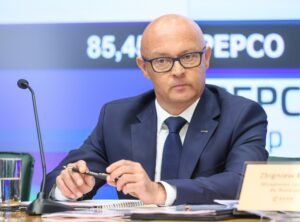The new Silk Road is a wonderful advertising slogan. However, it looks less attractive from backstage in the neighborhood of Poland. This is a corruption scandal in China, interests with the Czech president and the war against PKN Orlen, writes Wojciech Jakóbik, editor-in-chief of BiznesAlert.pl.
Interests with the Czech president
The Chinese company CEFC China Energy is to sell assets worth 20 billion yuan or 3,2 billion dollars. 100 properties will be sold, including offices, hotels and residential buildings around the world. The exception is to be assets in the Czech Republic. For a good reason.
The Shanghai council took control of CEFC, and the asset disposition was taken over by the Chinese Development Bank after the founder of Ye Janming received a charge of economic crimes. Interestingly, despite the reports of the free press in Hong Kong about detention, central authorities have maintained for some time that Ye was only asked to help in the investigation. It is not known whether he lives.
Western observers are afraid that this may be an element of struggle at the top of power in the Communist Party. The arrest warrant was to be issued by President Xi Jinping himself in the framework of anti-corruption policy, for which according to Reuters there is a game about maintaining influence in the party. Xi promised to fight with „flies and tigers” that there would be no tolerance for corruption at any level. However, the detention of about three hundred officials associated with Zhou Yongkang, a former politburo member considered a rival of the current leader, imposes a different interpretation.
The ownership structure is to change. The changes threaten, among others, the privatization of Rosneft’s shares, which BiznesAlert.pl wrote about. Despite CEFC’s problems, the company will remain in the Czech Republic. The office of President Milosz Zeman intervened in this matter. Perhaps thanks to the exceptional hospitality of the president accused of opaque links with Chinese and Russian business, CEFC Europe has ensured that the activities in the Czech Republic will be continued with the help of a new shareholder who will replace Ye. Czech tyden.cz reported that it could be a CITIC group that would take over 49 percent of CEFC Europe shares.
CEFC holds shares in state-owned airlines, Czech hotels. It has the Pivovary Lobkowicz Group brewery and SK Slavia Praga sports club. CEFC Energy Europe has suddenly grown from a little-known Chinese company into a big player with investments in energy around the world. The President Je found himself on the list of Forty’s forty greatest rich people under 40. At the age of about 20 years, he received oil assets and loans from state-owned banks for foreign expansion. This is an example of a history „from zero to a millionaire” unusual for the Chinese communist regime.
The war with Orlen
The mysterious company also owns 9,9 percent of shares in the J&T Finance Group. In October last year, it declared its readiness to take over 50 percent. It was to be the largest CEFC business in the Czech Republic. J&T is PKN Orlen’s rival in the game for Unipetrol shares, which the Poles wanted to buy from J&T. In February 2018 Orlen sealed the transaction, which will allow it to increase its stake in Unipetrol to over 90 percent. In this way, the game for influence in the Czech Republic ended with the victory of Poles.
The dispute began with the criticism of Unipetrol’s investment policy under the influence of PKN Orlen. The minority shareholders of J&T were against the purchase of Spolana, to which the current Prime Minister of the Czech Republic, Andrej Babiš, has been keen on buying. Spolana serves Orlen to cheaper PVC acquisition, but is also a competitor to other J&T assets. The acquisition of Unipetrol shares from J&T ends this dispute. It is not known whether after the Orlen victory, the Chinese CEFC will still be interested in J&T shares.
The Unipetrol group, whose net profit for the 12 months of 2017 amounted to almost CZK 8,7 billion, includes refinery and petrochemical complex in Litvinowo, including Chempark Zaluzi, the largest of its kind in the Czech Republic. – With the acquisition of full control over Unipetrol, we will be able to take advantage of synergy benefits realized through optimization projects and strengthened segment management in the future – at the end of 2017, PKN Orlen, the then president of the company, Wojciech Jasiński, chairman of the Unipetrol supervisory board, justified it.
The new Silk Road from the backstage
Chinese entities like CEFC may have an adverse effect on the economic security of the countries in which they are active. The New York Times says that such funds mix money with diplomacy to obtain strategic assets, and perhaps information as well. The US Department of State informed in November 2017 that former Senegal Minister of Foreign Affairs Cheikh Gadio and former Hong Kong secretary of internal affairs Chi Ping Ho offered bribes to officials in Chad and Uganda for favorable decisions for the „oil company.” The context shows that it is about CEFC. It was after Ho’s arrest that the Ye case began.
For soft political influence CEFC uses the Commission of the Chinese Climate Fund. Ye was its vice president. China’s climate rhetoric is known from the G20 summit in Hamburg, where the leader Xi Jinping appealed to the US to join the global fight against climate change. This is an official action. The fund, on the other hand, is supposed to be used to gain influence on expert circles, for example by funding think-tanks.
It should be taken seriously that the ultimate goal of Chinese activities in the Unipetrol case was to take over the refinery currently owned by PKN Orlen. This would connect the interests of the Chinese and Russians, and in order to put pressure on the Poles they could cooperate, for example in the case of unexpected problems with the supply of Russian oil to the Orlen refinery in the Czech Republic. The Chinese are interested in energy assets. The minimum plan could be obstructing the work of PKN Orlen through J & T lawsuits against the Polish company.
Even without a refinery, the Chinese will stay in Zeman’s country, because they are also targeting the expansion of the Dukovany nuclear power plant. According to the Czech media, Beijing pressed for Prague to get a CGN order for this project without a tender. It is not known whether similar pressures were applied to Poland, which also talked to the Chinese about cooperation on the atom. Interestingly, Babiš may unexpectedly become an ally of the Poles, who, unlike the president, may be afraid of increasing Chinese influence.
Does Poland want such a partner?
PKN Orlen’s battles with J&T could prove that the Poles entered the territory of the Chinese. It can not be excluded that CEFC, who tastes in hydrocarbon assets, had a long-term desire for the Czech Refinery. It is not known how CEFC Europe will behave without Ye and who will manage this company in the future. The Middle Kingdom will take good care of it. In the discussion about Poland’s participation in the New Silk Road, there is often an argument that the Czech Republic (nomen omen located outside the route) distracts China’s attention from Poland, because they try harder. Are we sure we want to try like President Zeman and invite the influence of companies such as CEFC?








